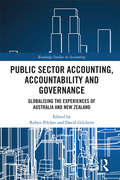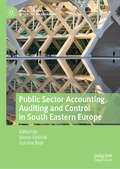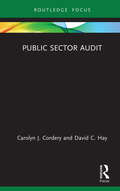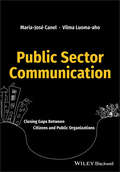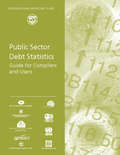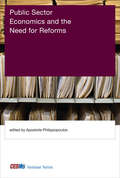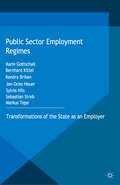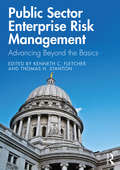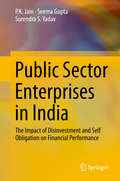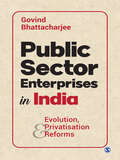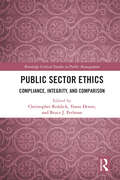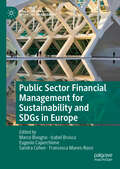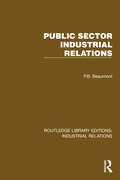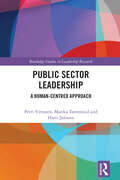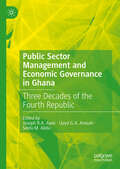- Table View
- List View
Public Sector Accounting, Accountability and Governance: Globalising the Experiences of Australia and New Zealand (Routledge Studies in Accounting)
by Robyn Pilcher David GilchristFunded by taxation, public spending cannot be separated from politics and ensuring efficiency and effectiveness is always high on the political and policy agenda. Accounting, accountability, governance and auditing are essential ingredients in evaluating public sector performance. Australia and New Zealand are world leaders when it comes to public sector accounting—such as being the first to introduce transaction-neutral accounting standards. This edited collection considers current issues impacting the public sector by primarily drawing upon experiences of Australia and New Zealand. Then, by combining history (from the time of the Domesday book, early sovereignty and Shakespeare) with current practice (differential reporting, international financial reporting standards, government performance, voter turnout, joined-up government and auditing practices), we use these experiences to illuminate the global issues of public sector accounting, accountability and governance. Based on rigorous research by top public sector researchers, this edited collection offers a multitude of future research ideas to enable those interested in following this pathway—whether they are in Australia, New Zealand, the United Kingdom, Europe, the United States of America, Africa or anywhere else in the world—an avenue to traverse.
Public Sector Accounting, Auditing and Control in South Eastern Europe (Public Sector Financial Management)
by Vesna Vašiček Gorana RojeThis book comprehensively presents the current practice and further development paths of public sector accounting, auditing and control systems in 7 South Eastern European countries based on the contributions of highly-respected researchers. Each chapter is a study of the territorial organisation, public sector scope, formulation and execution of central government and local and regional self-government budgets, accounting and financial reporting reforms and practice, audit and other oversight (supervision) in the public sector, and challenges in the further development of public sector accounting and auditing of each country. It also provides insights into the challenges that SEE countries are faced with as they move towards the adoption of accrual accounting and the implementation of IPSAS and/or EPSAS, and offers a valuable reference resource for academics, researchers, students, auditors, public administrators, policy makers and standard setters.
Public Sector Accounting, Financial Accountability and Viability in Times of Crisis (Public Sector Financial Management)
by Josette Caruana Giovanna Dabbicco Marco Bisogno Johan ChristiaensThis book examines the implications of the Covid-19 pandemic for public-sector accounting and finance. It provides a holistic overview of government initiatives to navigate the pandemic, focusing on how government policies and related spending have affected the budgetary process, the disclosure of information and transparency, as well as the importance of accounting technologies and operating systems in times of crisis. The book shows how government economic interventions have been crucial in counteracting the financial consequences of the global pandemic, and emphasizes the importance of accountability. It will appeal to students and scholars of public policy, public administration and finance, as well as policymakers and public managers responsible for public sector financial and budgetary reporting of public administrations.
Public Sector Audit (Routledge Focus on Accounting and Auditing)
by Carolyn J. Cordery David C. HayThis book provides a concise overview of the current context and types of public sector audit and the varied structures within which public sector audit is practised across the world. It summarises the objectives of public sector audit as well as explores the role of the International Organisation of Supreme Audit Institutions in providing guidance to these. Drawing on public and private sector audit as well as the views of academics and practitioners on public sector audit, it provides a unique research-based guide to the current issues and future challenges in the field.
Public Sector Communication: Closing Gaps Between Citizens and Public Organizations
by Maria Jose Canel Vilma Luoma-AhoA comprehensive guide to future-proofing public sector communication and increasing citizen satisfaction How to communicate with the citizens of the future? Why does public sector communication often fail? Public Sector Communication combines practical examples from around the world with the latest theoretical insights to show how communication can help bridge gaps that exist between public sector organizations and the individual citizens they serve. The authors—two experts in the field with experience from the public sector—explain how public entities, be they cities, governments, foundations, agencies, authorities, municipalities, regulators, military, or government monopolies and state owned businesses can build their intangible assets to future-proof themselves in a volatile environment. The book examines how the recent digitalization has increased citizen expectations and why one-way communication leaves public sector organizations fragile. To explain how to make public sector communication antifragile, the authors map contributions from a wide variety of fields combined with illustrative examples from around the world. The authors propose a research-based framework of different intangible assets that can directly improve communication in the public sector. This important resource: Helps explain the sector-specific conditions and why communication is often challenging in the public sector Summarizes all relevant literature on the topic across disciplines and includes the most popular management ideals of the recent decades Explores how public sector organizations can increase citizen satisfaction with effective communication Presents new approaches to both the study and practice of communication in the public sector Provides international examples of successful public sector communication Offers realistic guides to building intangible assets in practice Written for advanced undergraduate and graduate students, as well as public managers and leaders, Public Sector Communication offers an illustrative, research-based guide to improving communication and engaging citizens of today and the future.
Public Sector Debt Statistics: Guide for Compilers and Users
by International Monetary FundPrepared by the Inter-Agency Task Force on Finance Statistics, this guide presents a conceptual framework for measuring the gross and net debt of the general government and classifying such debt liabilities by instrument and by sector of the counterpart to the debt instrument. Example forms are provided for two summary tables, five detailed tables, and six memorandum tables for presenting the debt statistics. Annotation ©2012 Book News, Inc. , Portland, OR (booknews. com)
Public Sector Economics and the Need for Reforms
by Apostolis PhilippopoulosThe public sector has grown substantially in the last fifty years. In the euro area, for example, total government expenditures have been around fifty percent of GDP since the early 2000s, resulting in a growing tax burden or high public debt or both. At the same time, government had intervened in all aspects of economic life, from the provision of public goods and services to product and labor market regulation. Research shows that the effect of government size on economic performance is positive in countries where the public sector is efficient but negative in countries where it is inefficient. In this book, experts from academe and central banking discuss reforms that would make the public sector more efficient and/or more equitable. After a rich review of the public sector reform policy agenda, with particular attention to the role of the public sector and how to improve the provision of public goods and services, the contributors offer theoretically and empirically informed perspectives on some specific policy topics. These include public wage and employment policy, the role of international institutions such as the World Bank in promoting public sector reforms, the optimal mix of tax policy, the measurement of public sector efficiency, and the study of fiscal sustainability. The contributors relate these topics to such deeper issues as individual incentives as well as to policy debates over privatization, and austerity. ContributorsKonstantinos Angelopoulos, Stylianos Asimakopoulos, Danilo Ballanti, Roberto A. De Santis, Roberto Dispotico, George Economides, Pedro Gomes, Gabriella Legrenzi, James Malley, Costas Milas, Ilaria Petrarca, Apostolis Philippopoulos, Francesco Porcelli, Roberto Ricciuti, Lodewijk Smets, Peter Birch Sørensen, Petros Varthalitis, Francesco Vidoli
Public Sector Economics and the Need for Reforms (CESifo Seminar Series)
by Apostolis PhilippopoulosTheoretically and empirically informed studies on the role and efficiency of the public sector, public wage and employment policy, privatization, tax policy, and fiscal sustainability.The public sector has grown substantially in the last fifty years. In the euro area, for example, total government expenditures have been around fifty percent of GDP since the early 2000s, resulting in a growing tax burden or high public debt or both. At the same time, government had intervened in all aspects of economic life, from the provision of public goods and services to product and labor market regulation. Research shows that the effect of government size on economic performance is positive in countries where the public sector is efficient but negative in countries where it is inefficient. In this book, experts from academe and central banking discuss reforms that would make the public sector more efficient and/or more equitable. After a rich review of the public sector reform policy agenda, with particular attention to the role of the public sector and how to improve the provision of public goods and services, the contributors offer theoretically and empirically informed perspectives on some specific policy topics. These include public wage and employment policy, the role of international institutions such as the World Bank in promoting public sector reforms, the optimal mix of tax policy, the measurement of public sector efficiency, and the study of fiscal sustainability. The contributors relate these topics to such deeper issues as individual incentives as well as to policy debates over privatization, and austerity. ContributorsKonstantinos Angelopoulos, Stylianos Asimakopoulos, Danilo Ballanti, Roberto A. De Santis, Roberto Dispotico, George Economides, Pedro Gomes, Gabriella Legrenzi, James Malley, Costas Milas, Ilaria Petrarca, Apostolis Philippopoulos, Francesco Porcelli, Roberto Ricciuti, Lodewijk Smets, Peter Birch Sørensen, Petros Varthalitis, Francesco Vidoli
Public Sector Economics: The Role of Government in the American Economy
by Randall G. HolcombeThis book attempts to integrate the study of the various aspects of public sector economics by viewing all the government's activities as a product of the democratic decision-making process.
Public Sector Employment Regimes: Transformations of the State as an Employer (Transformations of the State)
by Bernhard Kittel Kendra Briken Markus Tepe Karin Gottschall Jan-Ocko Heuer Sylvia Hils Sebastian StrebPublic Sector Employment Regimes.
Public Sector Employment Regimes: Transformations of the State as an Employer (Transformations of the State)
by Bernhard Kittel Kendra Briken Markus Tepe Karin Gottschall Jan-Ocko Heuer Sylvia Hils Sebastian StrebThis book explores the extent to which a transformation of public employment regimes has taken place in four Western countries, and the factors influencing the pathways of reform. It demonstrates how public employment regimes have unravelled in different domains of public service, contesting the idea that the state remains a 'model' employer.
Public Sector Enterprise Risk Management: Advancing Beyond the Basics
by Kenneth C. Fletcher Thomas H. StantonThrough a series of case studies and selected special topics, Public Sector Enterprise Risk Management presents examples from leading Enterprise Risk Management (ERM) programs on overcoming bureaucratic obstacles, developing a positive risk culture, and making ERM a valuable part of day-to-day management. Specifically designed to help government risk managers, with concepts and approaches to help them advance risk management beyond the basics, the book: Provides a balanced mix of concepts, instruction and examples; Addresses topics that go beyond the basics of Enterprise Risk Management (ERM) program design and implementation; Includes insights from leading practitioners and other senior officials. Many government organizations can refer to the growing body of materials that provide examples of ERM processes and procedures. Far fewer reference materials and examples exist to help organizations develop a risk-mature organizational culture that is critical to the long-term success and strategic value that ERM represents to government organizations. Public Sector Enterprise Risk Management begins to fill that void and is intended to help public sector risk managers overcome barriers that inhibit ERM from becoming an active contributor to major decisions that top officials must make.
Public Sector Enterprises in India
by P. K. Jain Seema Gupta Surendra S. YadavThe book examines the various aspects of non-financial central public sector enterprises (PSEs) in India, for a period from 1986-87 to 2010-11. The analysis is based on all the key financial ratios; namely, profitability, efficiency, liquidity, leverage and productivity. Liberalization and globalization have caused competition in India and have lowered the profit margins. At the same time, Indian government has reduced subsidies and budgetary support for PSEs to curtail their own fiscal deficit. Strategic and economic reforms were also introduced in PSEs to make their operations commercially profitable so that they are not dependent on the government to meet their financial requirements on the one hand, and have their own earnings to finance their expansion/modernization requirements as well as their social obligations, on the other. To what extent, the PSEs have succeeded in this objective constitutes one major aspect of the present research work. The other equally important aspect examined is financial performance of the PSEs which have opted for disinvestment and have signed memorandum of understanding (MoU)/ self obligations. The Indian Government has desired the central PSEs to be profitable in their operations in post-liberation era of 1990s. For this purpose, two major instruments, namely, disinvestment and MoUs, were introduced. This book examines, in detail, financial performance of PSEs which had opted for disinvestment and have signed MoU. Based on analysis/ findings and literature on the subject, the book contains some concrete suggestions that would prove extremely helpful to Indian Government to further improve their financial performance.
Public Sector Enterprises in India: Evolution, Privatisation and Reforms
by Govind BhattacharjeePublic Sector Enterprises in India is a comprehensive and authoritative work covering the entire public sector in India, including the financial sector public enterprises such as banks and insurance companies. The book begins with the philosophy behind the public sector and traces its evolution in India and its subsequent privatisation and disinvestment after the economic liberalisation of 1991. Based on the most up-to-date data and the latest developments, it examines the plight and options of a public sector paralysed by excessive government interference and now trapped hopelessly between the State and the market. Drawing widely upon global experiences, the book argues that disinvestment and privatisation need not be the only answer to reform the public sector companies. They can be rejuvenated and transformed into global champions if freed from the stifling controls by an unimaginative government machinery, by depoliticisation and separation of the government’s roles as a majority stakeholder, policy-maker and regulator—and by changing their holding structure.
Public Sector Ethics: Compliance, Integrity, and Comparison (Routledge Critical Studies in Public Management)
by Christopher Reddick Tansu Demir Bruce J. PerlmanPublic Sector Ethics: Compliance, Integrity, and Comparison presents a comprehensive treatment of the subject of ethics in the public sector. What structural elements are necessary and how to create organizations that make ethics their priority are the questions that this edited book addresses. It focuses on ethics management in public organizations and includes national case studies from select low- to middle-income countries.Taken together, the chapters in this book cover the mechanisms, activities, and approaches that public organizations employ in ethics management. These are of utmost importance because the actions of public organizations affect citizens’ lives, liberties, and property, and their ethical character affects citizens’ faith in government. Numerous factors are at play in each instance of ethics management in public organizations, and controlling ethical behavior is difficult. This book suggests that effective ethics management requires a comprehensive approach. Traditional approaches such as ethics codes, policies and legislation, training, incentives, sanctions, monitoring, and compliance reviews are tools to achieve ethical conformity. Yet, they are effective only if leadership, values, and cultural transformation support them. This edited volume is a cohesive treatment of the subject, covering traditional approaches to ethics management, such as monitoring and compliance, and more contemporary approaches, like integrity building through ethical leadership and organizational values, as well as how to skillfully and effectively combine them to change organizational ethical contexts.This book exposes readers to new approaches and emerging issues in public sector ethics, aids in understanding the challenges of creating ethical organizations, and helps to develop a deeper understanding of ethics management in government organizations. It will be of interest to researchers, academics, and advanced students in the fields of business ethics, public administration and management, leadership, and organizational studies.
Public Sector Financial Management for Sustainability and SDGs in Europe (Public Sector Financial Management)
by Isabel Brusca Eugenio Caperchione Sandra Cohen Francesca Manes-Rossi Marco BisognoThis book analyses the implications of sustainability on public financial management in Europe. Public sector entities at national, regional, and municipal levels all have an important role to play in achieving sustainable development, and are developing strategies to reach this goal. These plans are usually guided by the UN's Sustainable Development Goals and involve public financial management systems, which are adapting to the demanding requirements of meeting these challenges. This book investigates how public financial management systems have been influenced by requirements for sustainability in Europe. It assesses multiple aspects linked to public financial management, including budgeting, accounting, reporting, and auditing. It also considers the impact of the SDGs on accounting systems, as well as other issues related to sustainability, such as green budgeting, gender budgeting, and sustainability and environmental reporting. By providing a cross-country comparison, it aims to identify similarities and differences across Europe. The book will appeal to scholars and students of public policy and financial management, as well as those interested in sustainability and the SDGs.
Public Sector Industrial Relations (Routledge Library Editions: Industrial Relations)
by P.B. BeaumontPublic Sector Industrial Relations (1992) concentrates on individual relations in the public sector, identifying the distinctive features of management organization, collective bargaining, strikes and dispute resolution. It offers not only an outline of the major developments in the public sector in Britain but a careful analysis of their effects and implications, comparing them in detail to systems in other countries.
Public Sector Innovation
by Mehmet Akif Demircioglu David B. AudretschGovernments around the world are under pressure to do more with less. Dispelling the conventional wisdom that government is the enemy of innovation, this book argues that the promise of innovation addressing the most compelling societal problems will only come to fruition if governments become full partners and participants in innovation. The authors provide a systematic overview, analysis, framework, research agenda, and strategic directions for the study of public sector innovation, examining drivers, sources, barriers, typologies, and outcomes of innovation along with ethics. They suggest that innovation in government requires a new approach to public sector strategy, organization, human resources, and culture. Featuring large data analyses and poignant case studies drawn from best practices across the globe, Demircioglu and Audretsch identify what works and what doesn't in transforming governments from the periphery to the very heart of the most profound innovations driving societal change and development.
Public Sector Leadership: A Human-Centred Approach (Routledge Studies in Leadership Research)
by Petri Virtanen Marika Tammeaid Harri JalonenDrawing its origins from Human Relations movement of the early 20th century and from public leadership orientations emphasizing human aspects, human-centred public leadership approaches leadership from a system´s perspective. It explores societal institutions, organizations, and phenomena as an emergent system structure that manifests its existence through the multilateral and reciprocal interaction of its parts. Systems thinking and the need for systemic change suggest that one can only understand improve a system by looking at how all the parts interact with each other and how they are integrated. The systemic nature of public leadership refers to dynamic learning mechanisms as they relate to the contents of leadership development tools which are derived mainly from the changing mode of the operating environment, from the leaders’ own experience, from their own personalities, from a learning-by-doing approach to leadership development and from the ways in which leaders learn and unlearn. This book presents key concepts, approaches, origins, applications, and best practices to understand the evolution and nature of human-centred approach in public leadership. It introduces a new public leadership paradigm that is needed in a complex, internationally interconnected social, economic, cultural, and political environment. Based on scholarly public leadership research in addition to the authors’ professional experience as academics, managers, practitioners and consultants, this volume offers guidance for decisionmakers, public, business, and non-governmental sector leaders, managers, and practitioners about how to create a context and contents for human-centred leadership in the age of complex society and turbulent operating environment. It will be of value to researchers, academics, and students in the in the fields of leadership and public management.
Public Sector Management
by Norman Flynn Alberto AsquerIn an era marked by unprecedented challenges, from the climate crisis to the rise of populism, the ways to manage public sector organisations have dramatically changed. In the eighth edition of this bestselling textbook, Flynn and Asquer offer the definitive introduction to public administration. Now substantially revised and updated throughout, this text reflects the latest approaches, tools and techniques that help governments respond to the multifaceted problems facing societies today and pre-empt those of tomorrow. Recognising the importance of context, Public Sector Managementunderscores that one-size-fits-all management practices are inadequate. Learn how public sector management adapts to changing political climates and societal pressures and be guided through the intricacies of making evidence-based policies while acknowledging the political dynamics that shape them. Updates to the eighth edition include: · A Global Perspective: Explore variations in public sector management shaped by cultural, historical, and institutional contexts, and gain a deep understanding of how governments address challenges in unique ways. · Balancing Theory and Practice: the new edition offers amore detailed and holistic perspective on public sector management by bringing in the latest theoretical insights and real-world public sector management practices. · Adapting to Change and tacking today’s issues: Confront the challenges faced in the age of technology, from artificial intelligence to Big Data; the climate crisis and clean energy transitions; and resulting from the latest geopolitical shifts including workforce migration to the erosion of trust in democracies. · A Call for Contextual Understanding: Learn how factors such as heterogeneity, population, income inequality, and technological access influence public sector management practices. Public Sector Management is essential reading for upper undergraduate and postgraduate students studying public sector management or public administration and is perfect for those studying on a Master of Public Administration programme. Norman Flynn was Director of the Centre for Financial and Management Studies, SOAS, University of London and Programme Director of the MSc in Public Policy and Management. Alberto Asquer is Head of the School of Finance and Management, Programme Director, MSc Public Policy and Management, and Senior Lecturer of Public Policy and Management at SOAS University of London
Public Sector Management
by Norman Flynn Alberto AsquerIn an era marked by unprecedented challenges, from the climate crisis to the rise of populism, the ways to manage public sector organisations have dramatically changed. In the eighth edition of this bestselling textbook, Flynn and Asquer offer the definitive introduction to public administration. Now substantially revised and updated throughout, this text reflects the latest approaches, tools and techniques that help governments respond to the multifaceted problems facing societies today and pre-empt those of tomorrow. Recognising the importance of context, Public Sector Managementunderscores that one-size-fits-all management practices are inadequate. Learn how public sector management adapts to changing political climates and societal pressures and be guided through the intricacies of making evidence-based policies while acknowledging the political dynamics that shape them. Updates to the eighth edition include: · A Global Perspective: Explore variations in public sector management shaped by cultural, historical, and institutional contexts, and gain a deep understanding of how governments address challenges in unique ways. · Balancing Theory and Practice: the new edition offers amore detailed and holistic perspective on public sector management by bringing in the latest theoretical insights and real-world public sector management practices. · Adapting to Change and tacking today’s issues: Confront the challenges faced in the age of technology, from artificial intelligence to Big Data; the climate crisis and clean energy transitions; and resulting from the latest geopolitical shifts including workforce migration to the erosion of trust in democracies. · A Call for Contextual Understanding: Learn how factors such as heterogeneity, population, income inequality, and technological access influence public sector management practices. Public Sector Management is essential reading for upper undergraduate and postgraduate students studying public sector management or public administration and is perfect for those studying on a Master of Public Administration programme. Norman Flynn was Director of the Centre for Financial and Management Studies, SOAS, University of London and Programme Director of the MSc in Public Policy and Management. Alberto Asquer is Head of the School of Finance and Management, Programme Director, MSc Public Policy and Management, and Senior Lecturer of Public Policy and Management at SOAS University of London
Public Sector Management and Economic Governance in Ghana: Three Decades of the Fourth Republic
by Joseph R. A. Ayee Lloyd G. A. Amoah Seidu M. AliduThis book is one of two volumes that examines the successes and failures of the Ghanaian Fourth Republic from a political, public administration, and public policy viewpoint. Published to coincide with the thirtieth anniversary of the founding of the Fourth Republic, these volumes bring together leading scholars to consider the political achievements and failures that have taken place in the country since 1993, and what these tell us about the state of politics and democracy in twenty-first century Ghana and beyond. This volume focuses on public sector management and economic governance. It assesses themes such as policy elites, policing, bureaucrats and public servants, the economy, decentralization, rural development, and foreign policy. The volume also places Ghana in a global context, demonstrating how lessons learnt from the country can be applied elsewhere, and what is unique about the Ghanaian experience. It will appeal to all those interested in public management, public administration, governance, economics, and African politics.
Public Sector Marketing Communications Volume I: Public Relations and Brand Communication Perspectives (Palgrave Studies of Public Sector Management in Africa)
by Ogechi Adeola Kojo Kakra Twum Paul KatuseAfrican nations are seeking ways to build strong institutions that are development-oriented and people-centred. Extant literature has reported the negative consequences of ineffective government communications with the public. In response, this book — the first of a two-volume edited work — focuses on marketing communication themes related to branding, public relations, trade fairs and exhibitions, and public sector communications. Public sector marketing communication plays a crucial role in bridging the gap between society and the government. Building a relationship with the public through appropriate communication tools and platforms is sacrosanct to restoring public sector image and trust. The book supports this effort by sharing conceptual and theoretical research towards the marketisation of Africa’s public sector as it strives to become an effective partner with the public it serves. Together with the second volume, which focuses on traditional and digital perspectives, this collection fills an existing information gap that is evident in Africa’s public sector.
Public Sector Marketing Communications, Volume II: Traditional and Digital Perspectives (Palgrave Studies of Public Sector Management in Africa)
by Ogechi Adeola Kojo Kakra Twum Paul KatuseBuilding public sector image and trust in Africa requires judicious use of appropriate marketing communications tools and platforms. Contributing authors to this second volume of a two-volume work offer insights into how the selection and strategic utilisation of marketing tools will facilitate interactions between the government and the citizens, improve inter-governmental and inter-agency collaboration, and boost a citizen-oriented public sector. Traditional marketing communications tools continue to play a key role in citizen and public sector relationships; however, given mega-trends of demographic change, urbanisation, and digitalisation in Africa, it is important to consider how public institutions, including government agencies, local government, universities, and football associations, respond and adapt to these changes. The digital revolution presents an opportunity for public sector institutions to align their communication plans with new technologies, particularly leveraging social media platforms.Together with the first volume, which focuses on public relations and brand communication perspectives, this collection fills an existing information gap evident in Africa’s public sector literature. The text serves as a decision making, teaching, and learning guide for practitioners, faculty, and students interested in applying marketing principles and practices to the public sector.
Public Sector Pay and Adjustment: Lessons from Five Countries (Routledge Studies In Development Economics Ser.)
by Christopher ColcloughChanges to levels of earnings in the public and private sectors have a critical role in the adjustment process. Case studies of Singapore, Korea, Zambia, Zimbabwe and Argentina show that in those countries which adjusted unsuccessfully real earnings declined sharply, often with a further negative impact on output. The governments of the more succes
